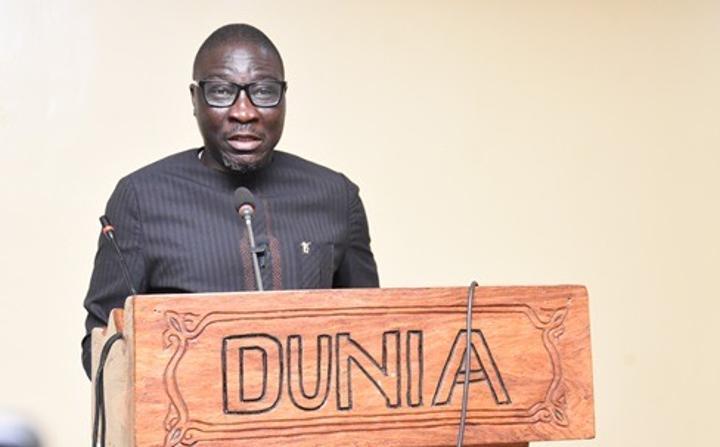Africa-Press – Ghana. Ghana has been praised by the Inter-Governmental Action Group Against Money Laundering in West Africa (GIABA), for demonstrating strong political will towards enhancing its Anti-Money Laundering (AML), Countering Financing Terrorism (CFT) and Proliferation Financing (FP) regimes.
Mr Edwin W. Harris Jr., the Director General of GIABA, who praised the country for its efforts against organised crimes, cited the firm resolution made by Ghana’s President John Dramani Mahama in March this year on AML/CFT, when he met with the Group.
He revealed that after admitting that it was during his past tenure in office that Ghana went on the Financial Action Task Force (FATF) grey list, President Mahama vowed that “Never again” under his administration should this happen.
“For me that is the strongest thing for a President of a nation to say, indicating a declaration of war on corruption and financial crimes, and GIABA will continuously provide technical support to the various institutions especially, the Financial Intelligence Centre (FIC) to continue to work effectively,” Mr Harris said.
He cautioned that being on the FATF grey list sent negative signals to strategic investors, therefore countries must avoid being listed as such, and must work hard to maintain their good statuses.
Mr Harris gave the remarks in an interview with the Ghana News Agency (GNA), on the sideline of a three-day Regional Training on Investigative Journalism on economic and financial crimes, organised by GIABA.
It was to broaden the knowledge and sharpen the skills of journalists from ECOWAS member states, to do in-depth reporting, effectively align with GIABA and other national institutions, increase public awareness, and responsibly expose perpetrators of Money Laundering (ML), Terrorist Financing (TF) among other financial crimes.
The GIABA Boss, cited Ghana as one of the model countries in the West African sub-region that other countries should look up to, in terms of the efforts being made towards AML/CFT, saying “Ghana is doing well and was the first country to be assessed during the second round of the mutual evaluation.”
He said under the mutual evaluation, there was a peer-to-peer review, where Ghana agreed be assessed by other ECOWAS member States, to see how it was fighting ML, what actions were being taken, the gains made, the challenges being faced, as well as the deficits within the system.
Although this does not go with any punitive actions; however, it helped countries to cleanse or guide others on what they were doing to improve, but then there were some benchmarks such that if a country performed a bit poorly then it would go on the FATF grey list.
Again, on effectiveness, Ghana was one of the countries among the Member States that did a little bit well, compared to its previous low score that ended it on the FATF grey and the European Union Black lists respectively, and had to work hard to get out of the predicament in 2021, he said.
Mr Harris explained the criteria for being listed under the grey list, as when the FATF considered a country to had so many strategic deficiencies, saying, in such instances GIABA would intervene and work with them to correct these deficiencies to restore the ‘fallen back on its feet’.
Currently, Ghana was preparing for the third round of the mutual evaluation with assessors from Nigeria, Seirra Leone, Liberia among other international partners and GIABA was hoping for improved records, he said.
The GIABA Boss however, indicated that financial crimes were such that they constantly reoccurred and perpetrators were becoming smarter by the day than the law (outsmart), because they knew these laws.
He said overall, Ghana, like most countries in the region, though doing well, there still existed challenges in the fight against financial crimes, some of which involved the Judiciary system, which lacked in-depth knowledge on AML and financial crimes making prosecution a bit difficult, but the good thing about this was the huge political will towards winning the fight.
Mr Harris cited the establishment of the FIC, Economic and Organised Crime (EOCO), and investigative bodies like the police, which were all up and working to fight these crimes.
He said GIABA was working with all member states, and that it had scheduled a regional training for Judges and Prosecutors within the month of October, to provide them with an understanding of the different dynamics under current financial crimes, that required a shift in criminal legislations, to counter the game of offenders.
“This is key because in most of GIABA’s jurisdictions the Criminal Procedure Law, requires a prove “beyond reasonable doubt,” meaning a person was innocent until proven beyond reasonable doubt that he or she was guilty of the crime, he said.
On the safe side, conviction could only be based upon the weight of evidence against a person, so traditionally, lawyers would go by that, but when it came to ML, it was different as the burden of proof was shifted on the accused, “so there is a shift in difference here,” he added.
Mr Harris said GIABA must bring judges and prosecutors up to speed and was hopeful that the President would stand by his statement, and encouraged other institutions to stand by this declaration of war on financial crimes, not only to help Ghana, but also to increase peace, stability and shared prosperity in investment within the region.
The third round of assessment has already started, and the onset of verification would be held between March and April 2026.
GIABA has received the first report for Ghana on technical compliance and effectiveness compliance, and secretarial assessors were going through the report, so the third round of mutual evaluation in Ghana has already started.
For More News And Analysis About Ghana Follow Africa-Press







